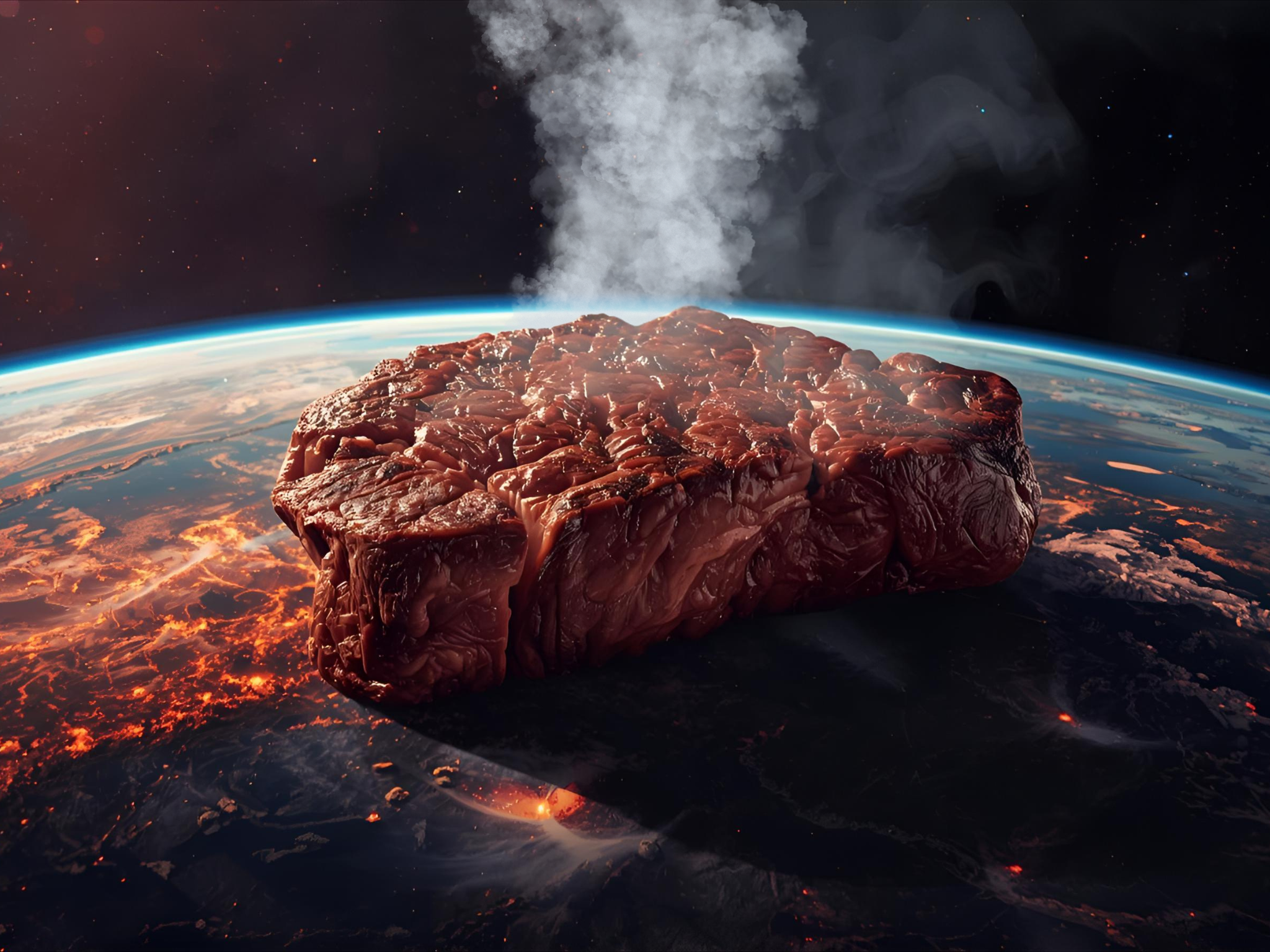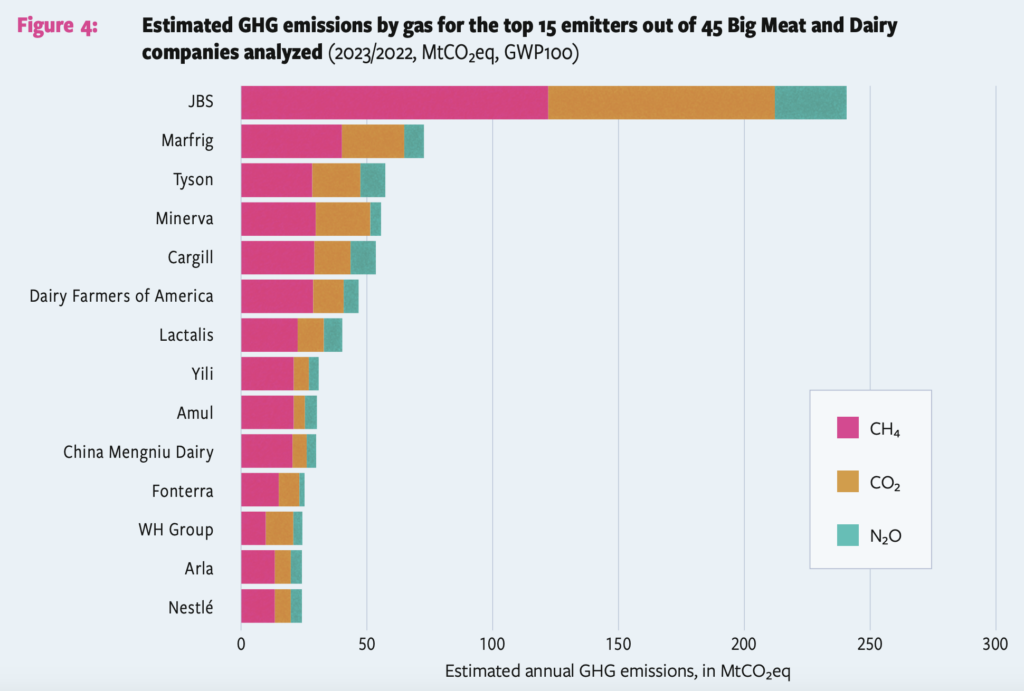
Combined emissions from the world’s top meat and dairy producers are on par with those of the biggest fossil fuel companies, and higher than those of Saudi Arabia.
This year, experts have warned that the world’s 1.5°C warming limit may be breached even earlier than originally thought. But a focus on one of the biggest culprits behind global emissions, the food system, is desperately lacking.
Agriculture is the second-largest source of greenhouse gas emissions, amounting to a third of the total, behind only fossil fuel production. Some foods are much more polluting than others, though; meat and dairy alone account for up to a fifth of global emissions.
In addition, the livestock industry is the primary emitter of methane, a gas 28 times more potent than carbon over a 100-year period. According to the UN, methane emissions must be cut by 40-45% by 2030 for the world to keep temperature rises below 1.5°C this century.
However, meat is in the ascendancy, with global consumption set to rise by 6% over the next decade, despite prices reaching all-time highs this year, thanks in large part to the climate crisis.
Now, weeks before the UN’s COP30 climate conference in Brazil, new analysis shows that a small number of meat and dairy giants are responsible for a disproportionately large share of the industry’s emissions. And instead of lessening their impact, these companies have spent hundreds of millions of dollars to lobby against climate action and promote false solutions to protect their bottom lines.
“Despite years of pledges to reduce emissions, major meat and dairy companies continue to recklessly drive climate-polluting production systems,” said Ben Lilliston, director of climate strategies at the Institute for Agriculture and Trade Policy (IATP), which co-published the report with Foodrise, Friends of the Earth US, and Greenpeace Nordic.
“It’s time for governments to step up and lead, with aligned regulations and public spending designed to cut emissions and support farmers in a transition toward more sustainable, lower-emitting farming systems,” he added.
Methane and cattle are the key sources of livestock’s climate woes

The analysis covered 45 leading dairy and meat companies, finding that they collectively emitted 1.02 billion tonnes of CO2e in 2022 and 2023, respectively. This is higher than the 2023 emissions of Saudi Arabia, the second-largest oil producer in the world.
Meanwhile, the 15 highest emitters from the livestock industry produced more combined greenhouse gases than Germany. And the top five – JBS, Marfrig, Tyson, Minerva and Cargill – were responsible for 480 million tonnes of emissions, higher than those of fossil fuel giants Chevron, Shell or BP.
In fact, JBS is by far the worst offender, accounting for a quarter (23.5%) of the emissions of the 45 companies analysed. It exceeds the greenhouse gas output of Shell and Exxonmobil combined, and the individual emissions of 81% of the world’s countries.
Methane was the source of 51% of the meat and dairy companies’ emissions, surpassing the EU and the UK combined in absolute terms. A third (34%) of the emissions came from CO2, and the rest from nitrous oxide.
Around 80% of the total emissions came from cattle, 11% from pigs, and 9% from chickens. Overall, these 45 companies slaughtered 17 billion chickens, 242 million pigs, and 53 million cows in 2023.
“The numbers are stark,” said Kari Hamerschlag, deputy agrifood director at Friends of the Earth. “We cannot be fooled by shameless greenwashing by Big Meat and Dairy companies.”
The report highlights how the meat and dairy industry touts limited tech-based fixes like biogas or feed additives, and pushes for the misuse of an emissions reporting metric that allows companies to distort and downplay their methane impact, an effort being accelerated ahead of COP30.

Governments urged to cut subsidies and tax high emitters
“As governments head to COP30 in the heart of the Amazon, an ecosystem devastated by global meat giants, scientists are clear that a failure to bring down agricultural emissions will torpedo us well past the Paris 1.5°C red line,” said Shefali Sharma, global agriculture policy expert at Greenpeace Germany.
“Farms that restore nature and communities, not corporate-controlled factories, should be at the centre of our food system. It’s not too late for governments to commit to such a transition in their climate plans coming out of this COP.”
The report outlines a policy roadmap for change, asking governments to take urgent action on a host of issues. They should introduce mandatory reporting of livestock production and slaughter numbers, as well as the Scope 1, 2 and 3 emissions of meat and dairy companies. Policymakers must also set binding targets for an absolute reduction of agricultural emissions, including separate methane targets.
Emissions reduction strategies should focus on the just transition of livestock, with strategies that eliminate overproduction and overconsumption of animal proteins, result in reduced herd sizes and protein diversification, facilitate a shift away from factory farming, and support healthy food production and working environments.
This can be done by shifting public subsidies away from livestock agriculture and animal feed towards nature restoration and farm systems that centre plant-based food production, as well as by divesting public pension funds and multilateral development banks from Big Meat and Dairy.
Policies that incentivise healthy, sustainable diets can help too: think reforms to procurement of food in public schools and hospitals, and to retail and catering business policies.
The report noted that governments should ensure livestock producers’ externalised environmental and social costs are instead paid by the polluting company, according to the ‘polluter pays’ principle. Additionally, public investment in the just transition to sustainable food systems can be funded through progressive taxation on society’s wealthiest, who tend to consume more meat and generate more greenhouse gases.
“If governments are serious about meeting climate goals, they can no longer ignore the climate impact of industrial meat and dairy,” said Friends of the Earth’s Hamerschlag. “Binding agricultural emissions targets, full supply-chain reporting, and support for a just transition toward agroecology and more plant-based food systems are essential.”
The post Top Meat & Dairy Companies Emit More Greenhouse Gases Than Saudi Arabia: Study appeared first on Green Queen.
This post was originally published on Green Queen.